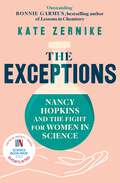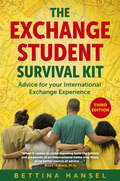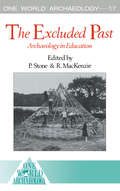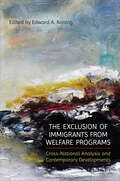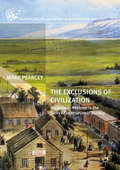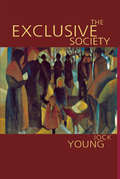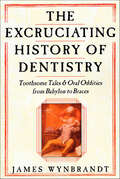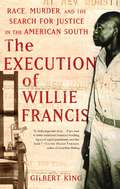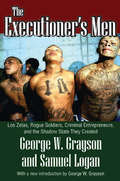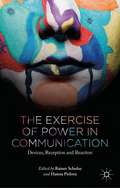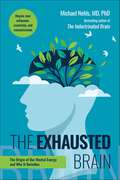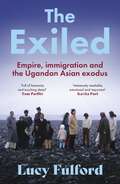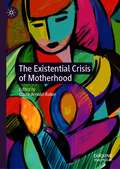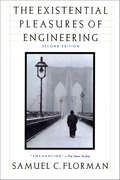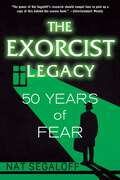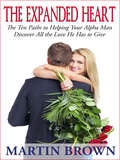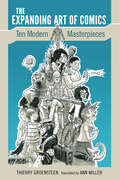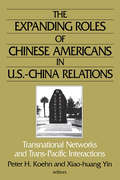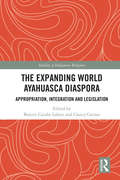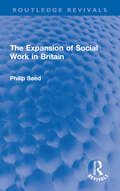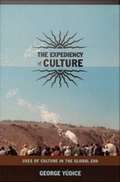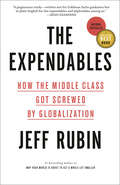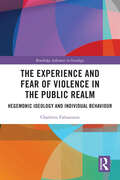- Table View
- List View
The Exceptions: Nancy Hopkins and the fight for women in science
by Kate Zernike&‘Outstanding&’ Bonnie Garmus, bestselling author of Lessons in ChemistryThe remarkable untold story of how a group of sixteen determined women used the power of the collective and the tools of science to inspire ongoing radical change. This is a triumphant account of progress, whilst reminding us that further action is needed. These women scientists entered the work force in the 1960s during a push for affirmative action. Embarking on their careers they thought that discrimination against women was a thing of the past and that science was a pure meritocracy. Women were marginalized and minimized, especially as they grew older, their contributions stolen and erased. Written by the Pulitzer Prize-winning journalist who broke the story in 1999 for The Boston Globe, when the Massachusetts Institute of Technology made the astonishing admission that it discriminated against women on its faculty, The Exceptions is an intimate narrative which centres on Nancy Hopkins – a surprisingly reluctant feminist who became a hero to two generations of women in science. In uncovering an erased history, we are finally introduced to the hidden scientists who paved the way for collective change.
The Exchange Student Survival Kit 3rd Edition: Advice for your International Exchange Experience
by Bettina HanselFOR STUDENTS GOING ABROAD, THE EXCHANGE STUDENT SURVIVAL KIT IS THE FIRST THING TO PACK!Study exchange has never been more important. Ask anyone who has been an exchange student. As we come more and more to realize how interconnected our world is, living for a time in another culture may be the most valuable experience a young person needs in the 21st Century.Students embarking on this life-changing adventure need tried-and-true advice. THE EXCHANGE STUDENT SURVIVAL KIT is the essential guide for young people interested in traveling abroad on an international exchange program. In an approach that documents each phase of the experience, it shows students how to avoid many common misunderstandings and problems that can occur in the course of their adjustment to a new culture, a new family, a new school and a new community.The book is full of examples taken from the experiences of dozens of exchange students from a broad spectrum of cultures and shows how to manage the unexpected "culture shock" and deal with the specific issues that emerge when immersing yourself in an unfamiliar culture.
The Excluded Past: Archaeology in Education (One World Archaeology #No.17)
by Peter Stone Robert MacKenzieA ground-breaking book that examines the uneasy relationship between archaeology and education. Argues that archaeologists have a vital role to play in education alongside other interpreters of the past. Contributors from different countries and disciplines show how the exclusion of aspects of the past tends to impoverish and distort social and educational experience.
The Exclusion of Immigrants from Welfare Programs: Cross-National Analysis and Contemporary Developments
by Edward A. KoningIn light of the increase in cross-border mobility and the recent political climate surrounding immigration-related issues, understanding the politics and policies of immigrants’ access to welfare programs is more relevant than ever. Systematic analysis of this subject has been held back, however, by the lack of a cross-national index of immigrant exclusion from social benefits over time. The Exclusion of Immigrants from Welfare Programs fills this gap by taking advantage of a novel and original measure called the Immigrant Exclusion from Social Programs Index (IESPI), which includes twenty-five indicators regarding immigrants’ access to seven different social programs, for twenty-two countries, at four moments in time. The book includes an assessment of key trends, an investigation of the origins and consequences of variation, and four detailed country case studies of particular theoretical interest: Norway, Austria, Portugal, and the United States. Presenting a cross-national index to facilitate and encourage systematic cross-country comparisons, this book provides insights and data that will allow researchers to probe such questions as the degree to which countries include or exclude immigrants in developing public policies, why some countries are more exclusionary than others, and what the future consequences of this exclusion might be.
The Exclusions of Civilization
by Mark PearceyThis book builds upon an inter-disciplinary body of literature to detail the centrality of European colonialism and imperialism in the constitution of modern international relations. A critical historical analysis that challenges conventional assumptions about the evolution and expansion of international society, it addresses the interconnections between the European and non-European sides of that history. Pearcey argues that features of European expansion were guided by a discourse on civilization, one that subsumed the uncivilized Other within the boundaries of the civilized Self. Doing so, civilization enabled a process of "exclusion by inclusion", whereby many of the world's indigenous peoples were gradually excluded from the "international" by being subsumed within the "domestic. " Challenging conventional assumptions about the evolution and expansion of international society, especially those of the English School, this book contributes to central debates in International Relations theory.
The Exclusive Society: Social Exclusion, Crime and Difference in Late Modernity
by Professor Jock YoungIn this major new work, which Zygmunt Bauman calls a 'tour de force of breathtaking erudition and clarity', Jock Young charts the movement of the social fabric in the last third of the twenthieth century from an inclusive society of stability and homogeneity to an exclusive society of change and division. Jock Young, one of the foremost criminologists of our time, explores exclusion on three levels: economic exclusion from the labour market; social exclusion between people in civil society; and the ever-expanding exclusionary activities of the criminal justice system. Taking account of the massive dramatic structural and cultural changes that have beset our society and relating these to the quantum leap in crime and incivilities, Jock Young develops a major new theory based on a new citizenship and a reflexive modernity.
The Excruciating History of Dentistry: Toothsome Tales & Oral Oddities from Babylon to Braces
by James WynbrandtAn “entertaining history” of the practice of dentistry that will remind you how lucky you are to live in the modern era (Publishers Weekly).For those on both sides of the dreaded dentist’s chair, James Wynbrandt has written a witty, colorful, and richly informative history of the art and science of dentistry. To all of those dental patients whose whine rises in tandem with that of the drill, take note: You would do well to stifle your terror and instead offer thanks to Apollonia, the patron saint of toothache sufferers, that you face only fleeting discomfort rather than the disfiguring distress or slow agonizing death oft meted out by dental-care providers of the past. The transition from yesterday’s ignorance, misapprehension, and superstition to the enlightened and nerve-deadened protocols of today has been a long, slow, and very painful process—as shown by such facts as:*Among the toothache remedies favored by Pierre Fauchard, the father of dentistry, was rinsing the mouth liberally with one’s own urine.*George Washington never had wooden teeth. However, his chronic dental problems may have impacted the outcome of the American Revolution.*Soldiers in the Civil War needed at least two opposing front teeth to rip open powder envelopes. Some men had their front teeth extracted to avoid service.*Teeth were harvested from as many as fifty thousand corpses after the Battle of Waterloo, a huge crop later used for dentures and transplants that became known as “Waterloo Teeth.”“You’ll gain a great deal of dental knowledge, acquired quite painlessly.” —The New York Times Book Review“Just the thing you need to get through your next oral probing.” —Entertainment Weekly“A breezy romp . . . While sensitive dentists may wince at having their profession’s rough-and-tumble past revealed, dental patients are more likely to feel relief at having been born in the modern era of dentistry. Both groups are in for a good laugh.” —Kirkus Reviews
The Execution of Admiral John Byng as a Microhistory of Eighteenth-Century Britain
by Joseph J. KrulderAccording to Voltaire's Candide, Admiral John Byng's 1757 execution went forward to 'encourage the others'. Of course, the story is more complicated. This microhistorical account upon a macro-event presents an updated, revisionist, and detailed account of a dark chapter in British naval history. Asking 'what was Britain like the moment Byng returned to Portsmouth after the Battle of Minorca (1756)?' not only returns a glimpse of mid-eighteenth century Britain but provides a deeper understanding of how a wartime admiral, the son of a peer, of some wealth, a once colonial governor, and sitting member of parliament came to be scapegoated and then executed for the failings of others. This manuscript presents a cultural, social, and political dive into Britain at the beginning of the Seven Years' War. Part 1 focuses on ballad, newspaper, and prize culture. Part 2 makes a turn towards the social where religion, morality, rioting, and disease play into the Byng saga. Admiral Byng's record during the 1755 Channel Campaign is explored, as is the Mediterranean context of the Seven Years' War, troubles elsewhere in the empire, and then the politics behind Byng's trial and execution.
The Execution of Willie Francis: Race, Murder, and the Search for Justice in the American South
by Gilbert KingOn May 3, 1946, in St. Martinsville, Louisiana, a seventeen-year-old black boy was scheduled for execution by electric chair. Willie Francis had been charged with murder; his trial had been brief; his death sentence never in doubt. When the executioners flipped the switch, Willie screamed and writhed as electricity coursed through his body. But Willie Francis did not die. Having miraculously survived, Willie was informed that the state would attempt to execute him a second time within a week. The ensuing legal battle went all the way to the Supreme Court, asking: Could the state electrocute someone twice? A gripping narrative about a brutal crime and its shocking aftermath, The Execution of Willie Francis offers a heroic--and ultimately tragic--tale of one man's quest for moral justice in a nation still blinded by race.
The Executioner's Men: Los Zetas, Rogue Soldiers, Criminal Entrepreneurs, and the Shadow State They Created
by George W. GraysonLos Zetas represent a new generation of ruthless, sadistic pragmatists in Mexico and Central America who are impelling a tectonic shift among drug trafficking organizations in the Americas. Mexico's marines have taken down the cartel's top leaders; nevertheless, these capos and their desperados have forever altered how criminal business is conducted in the Western Hemisphere. This narrative brings an unprecedented level of detail in describing how Los Zetas became Mexico's most diabolical criminal organization before suffering severe losses.In their heyday, Los Zetas controlled networks of American police, politicians, judges, and businessmen. The Mexican government is losing its "war on drugs," despite the military, technical, and intelligence resources provided by its northern neighbor. Subcontracted street gangs operate in hundreds of US cities, purchasing weapons, delivering product, executing targeted foes, and bribing the US Border Patrol. Despite crippling losses Los Zetas still dominate Nuevo Laredo, the major portal for legal and illegal bilateral commerce. They also work hand-in-glove with the underworld in Guatemala, El Salvador, and Honduras, as well as with gangs like the Maras Salvatruchas.
The Exercise of Power in Communication
by Rainer Schulze Hanna PishwaPower Exercise explores the various choices speakers or communicators make when expressing power relations in modern societies. The volume brings together several disciplines, such as linguistics, sociology, communication studies and social psychology, to give insight into how interactants co-construct different aspects of power in their everyday life. The chapters reveal that the power potential of linguistic elements is dependent on context and is by no means fixed or predetermined, whichprovides implications for research methodology.
The Exhausted Brain: The Origin of Our Mental Energy and Why It Dwindles
by Michael NehlsRevitalize Your Brain, Reclaim Your Mental Energy Everyone knows the feeling after a long day—it is difficult to concentrate, make good decisions, or even empathize with others. This daily but completely natural decline in our mental capacity is called &“ego depletion,&” a state of mind that miraculously but naturally disappears after a good night's sleep. However, more and more people are waking up in a perpetual state of ego depletion: their mental energy source is not recharging—it is actually shrinking. We live in a chronically exhausted society with disastrous consequences for ourselves, society, and future generations. In The Exhausted Brain, Dr. Michael Nehls uncovers the source of our mental energy. He reveals where our "brain battery" is located, what function it serves within our brain, and how we can stop and reverse the decline in its capacity—with profound consequences for our mental wellbeing and social capacity. In short, this book will change the world.
The Exiled: Empire, Immigration and the Ugandan Asian Exodus
by Lucy FulfordUganda, August 1972. President Idi Amin makes a shocking pronouncement - the country's South Asian population is being expelled. They have ninety days to leave.After packing scant possessions and countless memories, 50,000 Ugandan Asians vied for limited space in countries including Canada, India and the United Kingdom. More than 28,000 expellees from Britain's former colony arrived in the UK and began building new lives - but their incredible stories have, until now, remained largely hidden.Fifty years on from the exodus, The Exiled draws on first-hand interviews and testimonies, including from the author's family, to illuminate a time of painful alienation and incredible courage. As an entire people stepped into the unknown, a global diaspora was born, and the fate of the United Kingdom changed forever.Journeying across continents and decades, this staggering work of reportage illuminates an essential, and under-explored, chapter in post-colonial history, challenging politically expedient narratives to uncover the true fate of minorities at the end of empire. "Weaving together tenderly reported personal stories with the grand sweep of imperial history, this is a compelling and impressive account of a time - and population - often overlooked." - Samira Shackle"A lyrical and penetrating examination of what happened to one family and the Ugandan Asians more broadly" - Giles Foden, author of THE LAST KING OF SCOTLAND
The Exiled: Empire, Immigration and the Ugandan Asian Exodus
by Lucy FulfordUganda, August 1972. President Idi Amin makes a shocking pronouncement - the country's South Asian population is being expelled. They have ninety days to leave.After packing scant possessions and countless memories, 50,000 Ugandan Asians vied for limited space in countries including Canada, India and the United Kingdom. More than 28,000 expellees from Britain's former colony arrived in the UK and began building new lives - but their incredible stories have, until now, remained largely hidden.Fifty years on from the exodus, The Exiled draws on first-hand interviews and testimonies, including from the author's family, to illuminate a time of painful alienation and incredible courage. As an entire people stepped into the unknown, a global diaspora was born, and the fate of the United Kingdom changed forever.Journeying across continents and decades, this staggering work of reportage illuminates an essential, and under-explored, chapter in post-colonial history, challenging politically expedient narratives to uncover the true fate of minorities at the end of empire. "Weaving together tenderly reported personal stories with the grand sweep of imperial history, this is a compelling and impressive account of a time - and population - often overlooked." - Samira Shackle"A lyrical and penetrating examination of what happened to one family and the Ugandan Asians more broadly" - Giles Foden, author of THE LAST KING OF SCOTLAND
The Existential Crisis of Motherhood
by Claire Arnold-BakerThis book offers a new perspective on the motherhood experience. Drawing on existential philosophy and recent phenomenological research into motherhood, the book demonstrates how motherhood can be understood as an existential crisis. It argues that an awareness of the existential issues women face will enable mothers to gain a deeper understanding of the multifaceted aspects of their experience. The book is divided into four sections: Existential Crisis, Maternal Mental Health Crisis, Social Crisis and Working with Existential Crisis, where each section. Each chapter is based on either experiential research or the author’s extensive therapeutic experience of working with mothers and reflects different aspects of the motherhood journey, all through the lens of a philosophical existential approach. The book is essential reading for mental health practitioners and researchers working with mothers, midwives and health visitors, but it is also written for mothers, with the aim to offer new insights on this important life transition.
The Existential Pleasures of Engineering
by Samuel C. FlormanA classic examination of how engineers think and feel about their profession and its philosophy.“A useful read for engineers given to self-scrutiny, and a stimulating one for the layman interested in the ancient schism between machines and men’s souls.” —TimeHumans have always sought to change their environment, building houses, monuments, temples, and roads. In the process, they have remade the fabric of the world into newly functional objects that are also works of art to be admired. Now as engineering plays an increasingly important role in the world while coming under attack for all manner of sins, one must wonder about the nature of the engineering experience in our time.In this, the second edition of his popular Existential Pleasures of Engineering, Samuel Florman perceptively explores how engineers think and feel about their profession. Dispelling the myth that engineering is cold and passionless, Florman celebrates it as something vital and alive. He views engineering as a response to some of our deepest impulses, rich in spiritual and sensual rewards. Opposing the “antitechnology” stance, Florman brilliantly emerges with a more practical, creative, and fun philosophy of engineering that boasts pride in his craft.First published in 1976, this classic book is essential reading for anyone curious about what wonders we have wrought.“Gracefully written . . . refreshing and highly infectious enthusiasm . . . imaginatively engineered.” —The New York Times Book Review
The Exorcist Legacy: 50 Years of Fear
by Nat SegaloffThe definitive, fascinating story of the scariest film ever made and its enduring impact in Hollywood and beyond—from the director&’s biographer comes a must-read for horror fans and cinema buffs, just in time for the movie&’s 50th anniversary and the release of the first movie in a new Exorcist trilogy. Includes a foreword by John Russo, author and cowriter of the seminal horror film Night of the Living Dead. On December 26, 1973, The Exorcist was released. Within days it had become legend. Moviegoers braved hours-long lines in winter weather to see it. Some audience members famously fainted or vomited. Half a century later, the movie that both inspired and transcends the modern horror genre has lost none of its power to terrify and unsettle. The Exorcist Legacy reveals the complete story of this cultural phenomenon, from the real-life exorcism in 1949 Maryland that inspired William Peter Blatty&’s bestselling novel on which the movie is based, to its many sequels, prequels, TV series, and homages. Nat Segaloff, biographer of the film&’s director, William Friedkin, draws on original interviews with cast, crew, and participants as well as revelations from personal papers to present an intriguing and surprising new view of the making of the movie, and its aftermath. Segaloff also examines as never before the keys to the movie&’s enduring appeal. Friedkin and Blatty&’s goal was far more ambitious than making a scary movie; they aimed to make people &“think about the concept of good and evil.&” The Exorcist succeeds, and then some, not just by creating on-screen scares, but by challenging viewers&’ deepest personal beliefs—and fears.
The Expanded Heart: The Ten Paths to Helping Your Alpha Man Discover All the Love He Has to Give
by Martin BrownThe Expanded Heart presents ten paths alpha males can follow that will open their hearts to a world of new possibilities, with the help of the women in their lives. In this easy to read, easy to follow guide, you'll learn to: - Make Peace with the Past - Live an Engaged Life - Harness the Power of Spiritual Awareness; and - Increase Your Appreciation of Intimacy. Each path requires the efforts of two loving partners to accomplish the desired results. Because of a persistent failure to see his partner's point of view, too many alpha males never fulfill their potential as life partners. Instead of opening up to new ideas, too many alpha males become disinterested and disconnected from their partners. Rather than keeping an open mind that helps nurture an expanded heart, their hearts grow harder and less giving. This book takes both partners on a journey of self-improvement and self-discovery. At the conclusion of this journey, you will both know the essential elements that create an expanded heart and enhance your lives together, allowing you to become the loving, committed partners you were always meant to be.
The Expanding Art of Comics: Ten Modern Masterpieces
by Thierry GroensteenIn The Expanding Art of Comics: Ten Modern Masterpieces, prominent scholar Thierry Groensteen offers a distinct perspective on important evolutions in comics since the 1960s through close readings of ten seminal works. He covers over half a century of comics production, sampling a single work from the sixties (Ballad of the Salt Sea by Hugo Pratt), seventies (The Airtight Garage of Jerry Cornelius by Moebius), eighties (Watchmen by Alan Moore and Dave Gibbons), and nineties (Epileptic by David B.). Then this remarkable critic, scholar, and author of The System of Comics and Comics and Narration delves into recent masterpieces, such as Building Stories by Chris Ware.Each of these books created an opening, achieved a breakthrough, offered a new narrative model, or took up an emerging tendency and perfected it. Groensteen recaptures the impact with which these works, each in its own way, broke with what had gone before. He regards comics as an expanding art, not only because groundbreaking works such as these are increasing in number, but also because it is an art that has only gradually become aware of its considerable potential and is unceasingly opening up new expressive terrain.
The Expanding Roles of Chinese Americans in U.S.-China Relations: Transnational Networks and Trans-Pacific Interactions
by Xiao-huang Yin Peter Koehn Xiao-Huang YinThis book addresses the historical and contemporary involvement of Chinese Americans from diverse walks of life in U.S.-China relations. The contributors present new evidence and fresh perspectives on familiar and unfamiliar national and transnational networks - including families, businesspersons, community newspapers, students, lobbyists, philanthropists, and scientists - and consider the likely future impact of such contacts on the most important bilateral relationship at the start of the new millennium. The volume makes a multidisciplinary contribution to understanding the extensive and vital roles and promise of Chinese Americans at this critical juncture in U.S.-China relations, and to revealing the importance of migrants as actors in contemporary global politics. The assessments shared by the contributors suggest that the nature and scope of the Chinese American involvement, particularly in global civil society networks, increasingly will determine the outcome of state-to-state relations between the United States and the PRC.
The Expanding World Ayahuasca Diaspora: Appropriation, Integration and Legislation (Vitality of Indigenous Religions)
by Beatriz Caiuby Labate Clancy CavnarDuring its expansion from the Amazon jungle to Western societies, ayahuasca use has encountered different legal and cultural responses. Following on from the earlier edited collection, The Expanding World Ayahuasca Diaspora continues to explore how certain alternative global religious groups, shamanic tourism industries and recreational drug milieus grounded in the consumption of the traditionally Amazonian psychoactive drink ayahuasca embody various challenges associated with modern societies. Each contributor explores the symbolic effects of a "bureaucratization of enchantment" in religious practice, and the "sanitizing" of indigenous rituals for tourist markets. Chapters include ethnographic investigations of ritual practice, transnational religious ideology, the politics of healing and the invention of tradition. Larger questions on the commodification of ayahuasca and the categories of sacred and profane are also addressed. Exploring classic and contemporary issues in social science and the humanities, this book provides rich material on the bourgeoning expansion of ayahuasca use around the globe. As such, it will appeal to students and academics in religious studies, anthropology, sociology, psychology, cultural studies, biology, ecology, law and conservation.
The Expansion of Social Work in Britain (Routledge Revivals)
by Philip SeedFirst published in 1973, The Expansion of Social Work in Britain presents an overview of the history of social work to develop an understanding of what modern social work ‘is’ and of what the rapid expansion of social work ‘means’ as a social phenomenon. Divided into three parts, Part I examines the traditions and the forms of social action in the nineteenth century from which social work originated. Part II presents the period following the Second World War and concentrate particularly on the development of family casework in relation to what was sometimes called ‘the problem of the problem family.’ Part III examines the context of the expansion of social work in Britain into the field of community work. This book is an essential read for students of social work and social work professionals.
The Expediency of Culture: Uses of Culture in the Global Era
by George YúdiceThe Expediency of Culture is a pioneering theorization of the changing role of culture in an increasingly globalized world. George Ydice explores critically how groups ranging from indigenous activists to nation-states to nongovernmental organizations have all come to see culture as a valuable resource to be invested in, contested, and used for varied sociopolitical and economic ends. Through a dazzling series of illustrative studies, Ydice challenges the Gramscian notion of cultural struggle for hegemony and instead develops an understanding of culture where cultural agency at every level is negotiated within globalized contexts dominated by the active management and administration of culture. He describes a world where "high" culture (such as the Guggenheim Museum in Bilbao, Spain) is a mode of urban development, rituals and everyday aesthetic practices are mobilized to promote tourism and the heritage industries, and mass culture industries comprise significant portions of a number of countries' gross national products. Ydice contends that a new international division of cultural labor has emerged, combining local difference with transnational administration and investment. This does not mean that today's increasingly transnational culture--exemplified by the entertainment industries and the so-called global civil society of nongovernmental organizations--is necessarily homogenized. He demonstrates that national and regional differences are still functional, shaping the meaning of phenomena from pop songs to antiracist activism. Ydice considers a range of sites where identity politics and cultural agency are negotiated in the face of powerful transnational forces. He analyzes appropriations of American funk music as well as a citizen action initiative in Rio de Janeiro to show how global notions such as cultural difference are deployed within specific social fields. He provides a political and cultural economy of a vast and increasingly influential art event-- insite a triennial festival extending from San Diego to Tijuana. He also reflects on the city of Miami as one of a number of transnational "cultural corridors" and on the uses of culture in an unstable world where censorship and terrorist acts interrupt the usual channels of capitalist and artistic flows.
The Expendables: How the Middle Class Got Screwed By Globalization
by Jeff RubinFrom the #1 bestselling author of Why Your World Is About to Get A Whole Lot Smaller, a provocative, far-reaching account of how the middle class got stuck with the bill for globalization, and how the blowback--from Brexit to Trump to populist Europe--will change the developed world.Real wages in North America have not risen since the 1970s. Union membership has collapsed. Full-time employment is beginning to look like a quaint idea from the distant past. If it seems that the middle class is in retreat around the developed world, it is. Former CIBC World Markets Chief Economist Jeff Rubin argues that all this was foreseeable back when Canada, the United States and Mexico first started talking free trade. Labour argued then that manufacturing jobs would move to Mexico. Free-trade advocates disagreed. Today, Canadian and American factories sit idle. More steel is used to make bottlecaps than cars. Meanwhile, Mexico has become one of the world's biggest automotive exporters. And it's not just NAFTA. Cheap oil, low interest rates, global deregulation and tax policies that benefit the rich all have the same effect: the erosion of the middle class. Growing global inequality is a problem of our own making, Rubin argues. And solving it won't be easy if we draw on the same ideas about capital and labour, right and left, that led us to this cliff. Articulating a vision that dovetails with the ideas of both Naomi Klein and Donald Trump, The Expendables is an exhilaratingly fresh perspective that is at once humane and irascible, fearless and rigorous, and most importantly, timely. GDP is growing, the stock market is up and unemployment is down, but the surprise of the book is that even the good news is good for only one percent of us.
The Experience and Fear of Violence in the Public Realm: Hegemonic Ideology and Individual Behaviour (Routledge Advances in Sociology)
by Charlotte FabianssonThis book explores violent and discriminatory values and beliefs and their interconnectedness between societal echelons. Violence has a foundation and a context. It comes from somewhere and is directed at someone or something, and it has an ambience established through generations of social, cultural, political, financial and religious strategies. It fashions nation-states’ hegemonic ideology and frames individual behaviours and attitudes, thus creating a milieu that enables the normalisation of violence. The focus is on violence-infused behaviours and actions in the public realm, a multifunctional environment for social and cultural activities, as well as a workplace, entertainment and transport hub. It is a public setting, sometimes demanding onerous deftness of individuals to stay safe. Attitudes, values and beliefs around violence, harassment and discrimination in the public realm frequently occur openly without anyone noticing that a crime has been committed, including by close bystanders. An audience steeped in societal hegemonic social and cultural patriarchal ideology might be oblivious to harassing or discriminative behaviours and attitudes against females, minority genders and ethnic minority groups. The habitual nature and normalisation of these invisible crimes make them easy to dismiss. Violence materialises on all societal levels: the hegemonic structural (macro) level, consisting of the society’s dominating political, financial, social, cultural and religious leaders, educational and community institutions (meso) level and the individual-agency (micro) level, hence the nationstate’s populace. Societal order is underpinned by structural, systemic and symbolic violence, all integrated into contemporary society’s cultural and social fabric, thus inconspicuous social norms as ingrained through internalisation. The book is written from a sociological perspective and within the risk society discourse, where the risk of violence in the public domain is omnipresent. Discourses of Arendt, Bauman, Bourdieu, Marx, Foucault, Galtung and Beck and present-day analysis underpin the discussions. The agency and political leadership research emphatically show that violence and discrimination are normalised and ingrained in the contemporary milieu.
